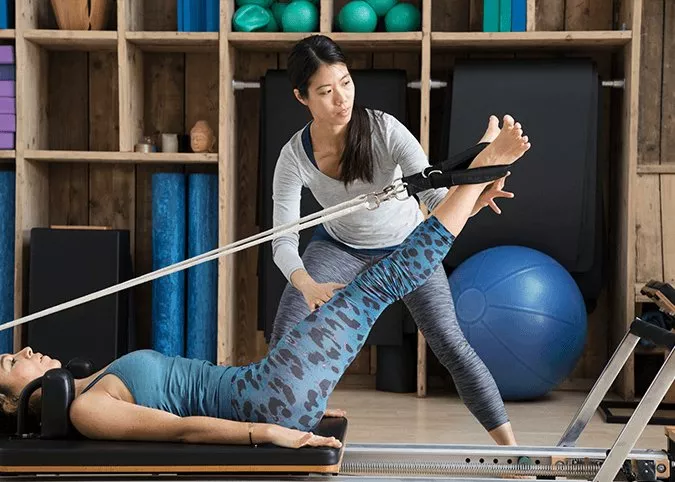Pilates
Pilates
Compare health insurance policies the easy way
Save time and effort by comparing a range of Australia’s health funds with iSelect
What is Pilates?
What’s the difference between Pilates and yoga?
What are the health benefits of Pilates?
Is Pilates covered by Private Health Insurance?
Is Pilates suitable for everyone?
What equipment do I need to do Pilates?
Where can I find suitable Health Insurance?
What is Pilates?
Pilates is a system of exercises designed to increase stability, mobility, and strength. While it has several subsets and variations, the most common types of classes available are:
- Mat Pilates
As you’d guess from the name, mat Pilates is done on a yoga mat on the floor. Although you might use some pieces of equipment, mat Pilates is mostly done just using your bodyweight and gravity. - Equipment-based Pilates
Equipment-based Pilates uses specific equipment that often creates resistance through loaded springs. A common type of Pilates equipment is the ‘reformer’, a moving platform that you push and pull along tracks. Other props, like weights, are also used.
What’s the difference between Pilates and yoga?
You might have heard people talk about yoga and Pilates in the same breath. While they do have some similarities – they’re both low-impact workouts that use body weight to build strength – in other ways, they’re very different.
Yoga is a holistic discipline that can be traced back to ancient Indian sacred texts. Over the centuries, and as it’s spread across the world, it’s continued to evolve. Nowadays, you can find yoga practices that are more focused on physical postures, and also practices with more of a spiritual focus.
Pilates, on the other hand, is a purely physical system – with a kind of wild history! It was developed in the early 20th century by Joseph Pilates, a boxer and circus performer.1National Geographic – The exercise phenomenon born in a prisoner-of-war camp While he was imprisoned in a British internment camp during the First World War, Pilates developed an exercise system based on the movements of cats. Later on, he opened a studio in New York, where his method was popular with dancers before it gained broader momentum.
What are the health benefits of Pilates?
Pilates has lots of health benefits, including increased muscle strength, tone and control, coordination, and improved posture. If you play sports, Pilates can be a great supplement to help you rehabilitate or prevent injuries related to muscle imbalances.
Pilates does tend to focus more on flexibility and control than you’d find in a typical fitness class, which might be more about strength or cardiovascular fitness. Pilates classes might still have you puffing and panting by the end, though!
Is Pilates covered by Private Health Insurance?
The low impact and precise movements involved in Pilates make it a great option for rehabilitation, which is why it’s often used as part of alternative or complementary health care plans.
Until 2019, Pilates could be covered by Private Health Insurance in the category of natural therapies. Unfortunately, government reforms mean that it’s no longer covered.
The good news is that the change doesn’t include Pilates exercises that are part of physiotherapy treatment. So if your physio uses elements of Pilates, you might still be able to claim under your Extras Cover.
Is Pilates suitable for everyone?
Back in the day, Pilates was mostly used by dancers and, later, athletes, to develop their flexibility and prevent and recover from injuries. Today, it’s widely popular – the Clearinghouse for Sport estimates that more than 750,000 Australians give it a go each year.2Ausplay – Pilates Report, p2
What precautions should I take before doing Pilates?
One of the things that makes Pilates so popular is that there are very low barriers to entry. You don’t need to be fit, strong, or experienced to benefit from a Pilates session. You can even do Pilates if you’re pregnant, though you might need modifications of some movements.
As with many forms of exercise, it’s a good idea to check in with your doctor before starting Pilates if any of the following apply to you:
- you’re male and over 45 or female and over 55
- you’ve recently had surgery
- you have preexisting medical conditions, such as heart disease or bone conditions
- you haven’t exercised in a long time.
What equipment do I need to do Pilates?
If you’re taking a Pilates class, you can generally just bring yourself, plus some water to drink and a yoga mat if you have one.
If you’re doing Pilates at home, there’s a wide range of options. You can definitely find online classes that don’t require any special equipment. Or if you have exercise equipment at home, plenty of it can be useful in Pilates, including:
- exercise balls
- exercise bands
- grip socks
- wrist or ankle weights
- foam rollers.
If you get a bit more serious, there are also lots of different types of specialised Pilates equipment you might find helpful. They include:
- Pilates rings (a circular piece of resistance equipment)
- Pilates arcs (a rounded piece of equipment that can be used to stretch or support the back)
- glider discs (discs that create resistance between your body and the floor).
Where can I find suitable Health Insurance?
If you’re in the market for a new Private Health Insurance Policy, we can help. Start comparing Health Insurance Policies online from our range of providers today, or call our friendly team on 1800 784 772.

.svg)






